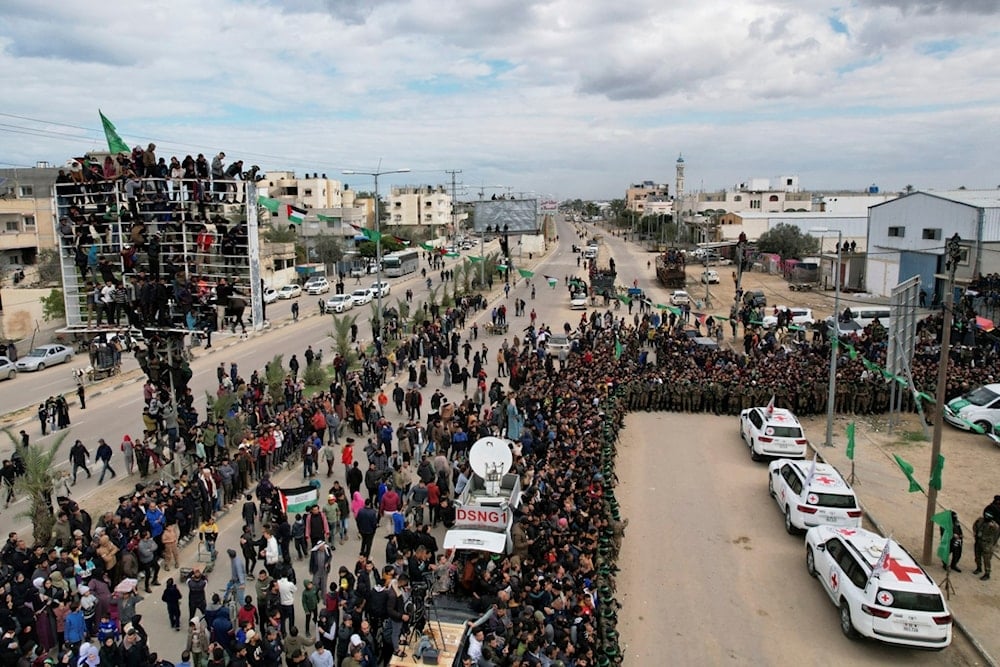Netanyahu moves to sabotage ceasefire talks: Israeli media
Israeli reports indicate that Netanyahu is more concerned about appeasing "Israel's" far-right factions than securing the freedom of Israeli captives.
-

International Red Cross cars wait for Israeli captives who have been held captives by Hamas in Gaza since October 7, 2023, in Deir al-Balah, central Gaza Strip, Saturday, February 8, 2025. (AP)
Israeli media on Sunday revealed that Prime Minister Benjamin Netanyahu is deliberately obstructing the ongoing ceasefire negotiations with Hamas, aiming to derail the agreement before its next phase.
Reports suggest that the Israeli delegation sent to Qatar lacks real authority, signaling Netanyahu's unwillingness to move forward with a deal that would secure the release of more Palestinian prisoners and a permanent ceasefire in Gaza.
Haaretz cited sources stating that the delegation's presence in Doha is merely for show.
"Netanyahu is signaling quite clearly that he does not want to move on to the next phase," one source said, adding that he views the ceasefire as politically damaging.
The reports indicate that Netanyahu is more concerned about appeasing "Israel's" far-right factions than securing the freedom of Israeli captives. "Right-wing voters see on the ground that we have not defeated Hamas and its operatives continue to walk around with weapons," the source explained, referencing a sign at a Hamas-organized captive release event in Gaza that mocked Netanyahu's claim of achieving "total victory."
Efforts to undermine the agreement
According to Haaretz, Netanyahu's obstructionist tactics could lead to the ceasefire breaking down entirely. Analysts warn that Hamas, recognizing "Israel's" refusal to honor its commitments, may halt further captive releases.
"Hamas is not stupid," a source said. "They see the politicization of the negotiations, the placement of Netanyahu confidants Ron Dermer and Gal Hirsch [at the helm of negotiations], the threats by [Finance Minister Bezalel] Smotrich and the right-wing ministers that they will dissolve the government. They understand where this is going."
Channel 12 confirmed that Netanyahu sent the delegation only to discuss technicalities and not to negotiate the second phase of the ceasefire. Officials stated, "This delegation has no real mandate. It will not deal with anything related to the second phase."
Among the delegation members was government hostage negotiator Gal Hirsch, along with a Shin Bet official replacing the security agency's head, Ronen Bar, who was removed from the process by Netanyahu.
Hamas officials have warned that "Israel's" bad-faith approach could reignite hostilities. In an interview with AFP, Hamas politburo member Basem Naim criticized "Israel's" failure to fulfill its obligations. "The delay and lack of commitment in implementing the first phase," as well as the attempts to "pressure the Palestinian negotiators upon entering the second phase, certainly exposes this agreement to danger and thus it might stop and collapse," he said.
Agreement in jeopardy
The first phase of the ceasefire, set to last 42 days, stipulates that Hamas will release 33 women, children, and elderly captives in exchange for the freedom of hundreds of Palestinian prisoners, many of whom have been detained without charge.
The next phase, if honored, would require "Israel" to release additional Palestinian detainees, halt military aggression, and withdraw from Gaza in exchange for the release of remaining captives.
Read more: 'Israel' finalizing withdrawal from key Gaza corridor under deal
Following the latest release, 73 captives out of the 251 taken on October 7 remain in Gaza, while at least 34 have been confirmed dead.
Hamas has so far released 21 captives under the current ceasefire, while 105 were freed during a brief truce in November. In contrast, "Israel" has continued its violent occupation, killing thousands of Palestinian civilians and maintaining its siege on Gaza.
"Israel" is also holding thousands of Palestinian prisoners, including children, journalists, and activists, many of whom have been subjected to inhumane treatment.
Political calculations
Israeli media reports suggest that Netanyahu's primary concern is preserving his political standing among the far-right, rather than achieving peace or ensuring the safe return of captives.
Walla reported that the delegation's trip to Qatar was largely symbolic, meant to placate US President Donald Trump, who has expressed interest in seeing the deal fully implemented.

 4 Min Read
4 Min Read










